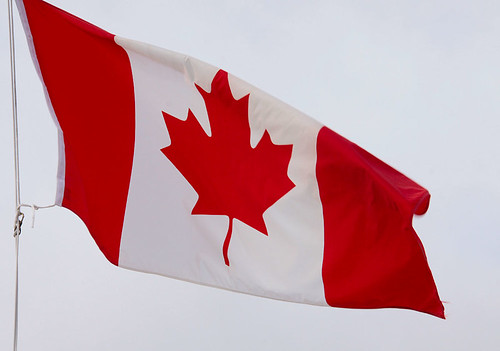
Photo courtesy of waferboard's Flickr page - Canadian flag: https://www.flickr.com/photos/waferboard/5653240459

Photo courtesy of Joseph Morris's Flickr page - Justin Trudeau | Corporate Video Production Toronto:
Okay, so Justin Trudeau will be Canada's next prime minister, and there has been much discussion since his election victory about how this happened, why it happened, and what it means for Canada's future.
Before I get into that, I must say this right off the bat: Justin Trudeau reminds me a little bit of John F. Kennedy, and it feels like the Trudeau family as a whole is starting to be Canada's answer to the Kennedy family here in the United States. Trudeau echoed the words of former Prime Minister Wilfred Laurier during his victory speech last night in Montreal, and he seems to exude that same youthful, energetic, idealistic vision that can inspire a country, much like Kennedy did half a century ago south of the northern border. The question then seems to be whether that will continue to inspire now, early in the 21st century, the way that it did in the mid-20th century.
Okay, now, back to the election.
I was listening to Q with Shad (Shadrach Kabango) and his guest panel, and they were mentioning that the election seemed to start to go downhill for the Conservatives once they seemed to make it about what it means to be a Canadian. Earlier this year, soon to be former Prime Minister Stephen Harper argued that it was offensive for a woman to wear a face-covering niqab when taking the oath for Canadian citizenship, and went on to say that this tradition came from a society that was, in his words, "anti-women."
Harper was blasted by Trudeau on this point, but he countered that the young son of the former prime minister just did not get it. He went on to suggest that one thing that Trudeau simply did not understand is that almost all Canadians agree that wearing a face covering under such circumstances was indeed offensive.
Trudeau suggested that Harper and the Conservatives were playing upon the worst kind of politics centered on fear. he went on to suggest that Harper “is willing to confuse and conflate the issues in ways that encourages ignorance … and quite frankly stokes fears and anxieties at a time where people are worried about terrorism and extremism.”
Trudeau concluded by saying, “This is the crassest kind of politics.”
Apparently, many Canadians agreed with him.
Trudeau seems to be moving Canada in a more progressive direction, and that is good. As an American, it is refreshing to see that our neighbors (excuse me, neighbours) to the north seem to have a more balanced and thoughtful approach to their politics, and where the term "liberal" is not used as a bad word, or as some piece of slander from which a political candidate can never recover.
Some of the things that Trudeau wants for Canada would be a fairer, tax system that forces the rich to pay their share of taxes (sounds similar to Bernie Sanders here, south of the border). He wants to invest more heavily on rebuilding the infrastructure of the country, and he also has his sights set on legalizing marijuana. Among some of the other reforms that Trudeau would like to see ushered in would be a election reform, and Canada accepting more refugees into the country.
However, one thing that I personally found a bit alarming about Trudeau was his support of Bill C-51, an anti-terrorist legislation that some have suggested is nothing less than a fascist piece of legislation. Whether or not that is an exaggeration, in this day and age, a bill that gives police more power of surveillance. Trudeau and the Liberals voted in favor of the bill, but promised to amend it if and when they won the election. Not that they have, let us hope that they at least make good on their promise to alter this bill, which just might be Canada's answer to the Patriot Act here in the United States.
Still, in any case, Trudeau seems quite decent otherwise. Trudeau has kind of been Canada's golden boy for a few years, the privileged son of a former prime minister who enjoyed a wealthy upbringing, had good looks and a charming personality, and was essentially an attractive option among Liberals to lead.
There have been times when this was used against him, such as when he participated in a charity boxing event. The Conservatives must have been commentating on the fight because they disparaged Trudeau, talking dismissively about his privileged upbringings, and even insulting his tattoo, suggesting that the tattoo of Patrick Brazeau, his opponent, was "real" since Brazeau is a native Canadian. Brazeau had been trained in the martial arts and had served in the Canadian Armed Forces, and was widely considered a huge favorite to make short work of Trudeau. In the first round, Brazeau clearly looked to rock and knock out Trudeau, trying to overpower him. However, Trudeau weathered these attacks, and then in the second and third, and final, rounds, Trudeau began to exact a measure of revenge, winding up knocking Brazeau out, enhancing his image as a manly man.
All of that is beside the point. Trudeau will likely be a refreshing change from Harper, who I feel cramped Canada's style a bit, with a more elitist agenda, and an anti-environmentalist record. Trudeau offers something new, something better for Canada, as he becomes Canada's first Liberal prime minister since Paul Martin back in 2006.
It will be interesting to see how he does.
What a Justin Trudeau Win Means for Canada Joanna Plucinska
http://time.com/4079278/justin-trudeau-canada-prime-minister/
Justin Trudeau scores major upset in Fight for the Cure boxing match over Conservative Senator Patrick Brazeau Postmedia News | March 31, 2012:
Justin Trudeau scores major upset in Fight for the Cure boxing match over Conservative Senator Patrick Brazeau Postmedia News | March 31, 2012:
No comments:
Post a Comment